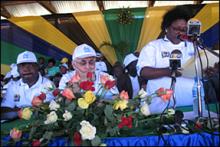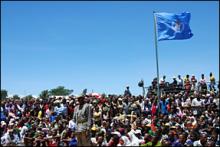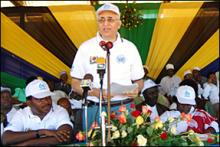Tanzania commemorates WHD 2008 and the 60th Anniversary of WHO at national level in Singida Region 700 KM from Dar Es Salaam
The World Health Health Day 2008 was commemorated in Tanzania at national level in Singida region which is 700 KM from Dar Es Salaam. This is in accordance to the Tanzania’s tradition of taking all International Health Commemorations to the regions, in efforts to ensure that rural areas are fully involved and benefit from these events. This colourful occasion which also marked the 60th Anniversary of the World Health Organization was launched on 6th April with exhibitions mounted at the Singida stadium involving more than ten service providing institutions.
Activities for the occasion included two days exhibitions, Essay and drawing competition as well as a massive public meeting conducted on the climax day on 7th April 2008.
This occasion was officiated by the Hon. Minister of Health and Social Welfare Prof. David Mwakyusa whose speech was read by the Singida Regional Commissioner on his behalf as he was attending a session of the National Assembly.
The commemorations were very well attended by around six to seven thousand people including representatives from neighbouring regions of Shinyanga, Dodoma and Mara, all districts in the region and others from the national level.
Singida residents listening to speeches on the WHD on 7th April 2008.
Activities for the climax day highly attracted masses through exhibitions, procession, music, traditional dances, poem and church choir.
Like all other International Health Days commemorated in Tanzania, the WHD 2008 was also a good opportunity for initiating School Health Clubs in the region. The preparatory committee staged some competitions on drawing and Essay writing whereby winners were awarded prizes by the Guest of Honor during the climax Day. This was an act of pride for those who received prizes and motivated other students to participate in such competitions in the future.
The welcome address from the host region was delivered by the Regional Administrative Secretary who thanked the Government for giving the region the honour to host the occasion at national level. He gave examples on how climate change has been affecting the region through disease outbreaks (malaria, RVF and diarrhoeal diseases), drought and water shortages.
The WR Tanzania, Dr. Mohammed Belhocine had an opportunity to deliver the WHO’s remarks on the occasion. The WR’s speech in-corporated the RD’s Message and elaborated on the theme for the WHD 2008 which focuses on the need to protect health from adverse effects of climate change as the greatest challenge of our time.
The guest of honour elaborated on the significance of WHD 2008 as it also marks the 60th Anniversary of WHO. He stated that it is true that within these 60 years experience WHO has accomplished great achievements including discovery of new technologies on how to effectively tackle health problems that affect the people in the world. He urged Tanzanians to use this opportunity to address effects of climate change in the country ranging from disease outbreaks, environmental degradation and natural disasters such as floods, droughts, landslides and volcano eruption.
The ag. Regional Commissioner for Singida delivering the WHD 2008 speech on behalf of the Minister of Health.
In Zanzibar WHD 2008 activities started on Friday 4th April with a press conference chaired by the Minister of Health. This was followed by trees planting at Masingini village in Unguja West District on 5th April. The main ceremony was held on Sunday 6th April because on 7th April each year, Zanzibar and the entire country marks the death of the first president of the Island. The WHD climax ceremony on the Island was officiated by the Minister Ministry of Energy, Land and Environment. Other dignitaries present included officials from Ministry of Information, the Metrological Department and an NGO called Association of Environment.
Three speeches were delivered by Meteorological department, Ministry of Agriculture and WHO message which was delivered by the PHCA Zanzibar, Dr N. Inusse.





